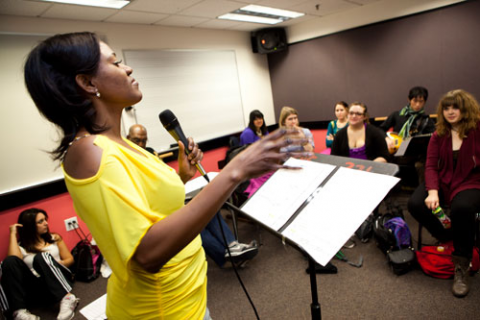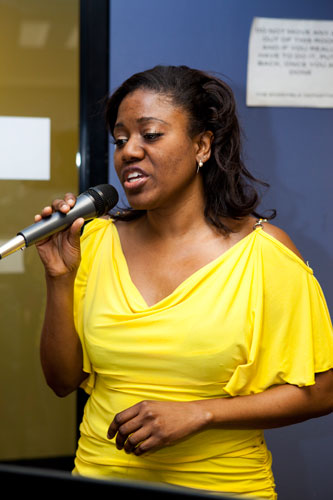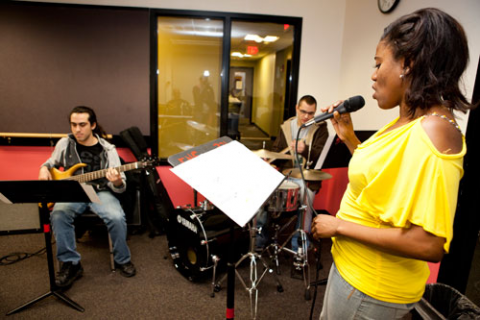Student Profile: Germaine Wilson

Germaine Wilson<br>
<b>Hometown:</b> Diego Martin, Trinidad and Tobago<br>
<b>Instrument:</b> Voice<br>
<b>Major:</b> Undeclared
Photo by Kelly Davidson

Wilson performs in Joey Blake's Rhythm and Grooves class.
Photo by Kelly Davidson

Singing since the age of 7, Wilson decided to get serious about music after she won a host of awards, finished her bachelor's degree, and got some real-world working experience.
Photo by Kelly Davidson

Getting accustomed to American culture and the weather in Boston has been a challenge for Wilson.
Photo by Kelly Davidson
Until recently, in addition to landing singing gigs in her native Trinidad and Tobago, Germaine Wilson was juggling a full-time job as a marketing officer for a credit union, managing her college cafeteria, getting her bachelor's degree, and selling Avon cosmetics.
But as her musical achievements continued to mount—from a finalist spot in a talent scout competition to an invitation to sing with the prestigious Lydians Choir to earning six championship trophies in a single Trinidad and Tobago Music Festival—she felt music was meant to play a larger role in her life.
In order to pursue music more seriously, Wilson knew she needed a better foundation. She looked to Berklee as the perfect training ground to fill out the gaps in her music education and open doors to a new level of professional performance.
Still, she had a bit of a bumpy start. At 37, Wilson is older than most students and at first felt out of place about missing some pop music references and her lack of formal musical training. She couldn't read music before coming to Berklee, and ear training and harmony, in particular, were a struggle. But with more than a semester to her credit, Wilson is making strides and finding opportunities to showcase her growing talents, including recent solo and duet debut performances at the Berklee Peformance Center for a Lena Horne tribute concert.
You have an interest in studying music business/management. You seem to already have a penchant for business.
While in college, I sold Avon. After college, I had the opportunity to fill a contract for managing my cafeteria, and I jumped at it. I've always loved business. I've always managed my musical career as a business. I kept my earnings in a separate account to see how much money I could make off a singing career. But while running the cafeteria, I didn't quit my day job as a marketing officer with a credit union. It was tough, because sometimes I would crash. I would reach the point where I'd have so much to do.
What's it like being older than most students here?
I think I'm taking it more seriously because of my age, but I also feel at a bit of a disadvantage. Most of the other students have more knowledge of music theory. My experience comes with actual performance. I've been performing for a long time. For example, in my Rhythm and Grooves class, where we perform with a band, I have experience performing with a band, but I don't have experience actually doing the lead sheet for myself, so that's where I'm learning.
Tell me about your Berklee experience so far.
First of all, analyzing music, that's something I've never been able to do—singing jazz and singing blues and not knowing about 12-bar blues and chord progressions. I've been out there singing music but don't know the formal aspect of it. I'd be able to sing in a band but not able to say "Go back to 1" or "Go back to 4." I didn't have that vocabulary. That in itself is awesome, being able to describe and analyze music, understanding improvisation, harmonies, and all these things. I know I wouldn't get this back home.
What are some of the cultural differences you've experienced here?
I remember someone once said to me, "You have an accent." My response was, "You have an accent, too." We both laughed. Berklee reminds me of Trinidad—a real mix of cultures that get along. We have a similar blend of people in our country, though we're predominantly African and Indian.
I've learned to alter the speed of my speech. I think Trinidadians speak too fast, because sometimes people don't understand me. I also have to be careful and concentrate on how Americans speak, as well, because I've noticed we pronounce vowels differently. In all, it's cool: different foods, music, languages. I hope to make friends with people from each continent at Berklee. Then I'd try visiting each one of them every time I had a vacation. I'd experience firsthand different cultures. That would be sweet.
What do you hope to do with your music education?
In so many ways, attending Berklee has been a leap of faith for me. It represents a turning point at this stage in my life. I hope to pass on everything that I learn at Berklee when I return to my country.
I want to be ready for whatever opportunity presents itself. I'll be able to market myself better. I'll be able to be a better musician. I feel I will have the authority to call myself a musician. Before, people would say, "Wow Germaine, you can really sing." But I got to the point where that wasn't enough.
